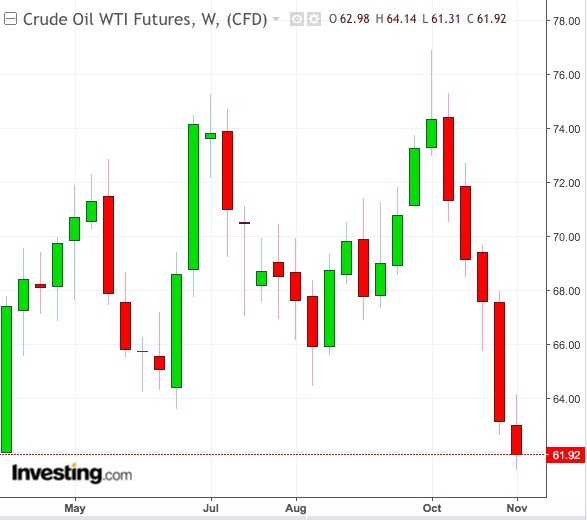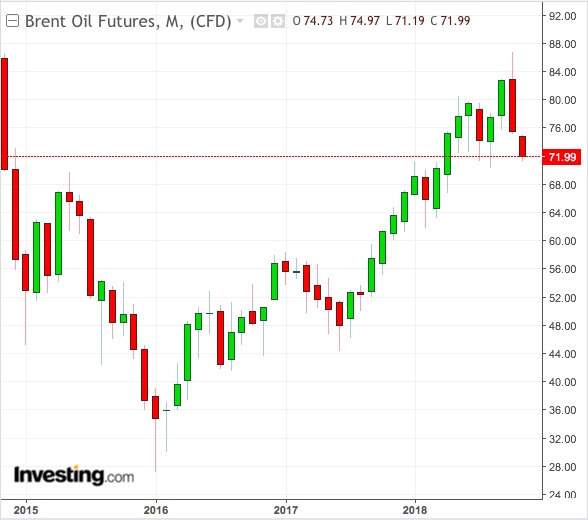“When in doubt, go back to the basics” is a constant refrain in business and life. And nowhere does that seem more apt now than in the oil market, where a burning question remains: did traders overplay the likely impact of US sanctions on Iranian exports? And more importantly, are they underplaying it now? Or emphasizing the wrong aspects?
The change to overall oil balances in the fourth quarter “is small in comparison to the extent of the change in sentiment and subsequent sell-off in prices,” London-based research consultancy Energy Aspects said, referring to the whipsaw market volatility that has accompanied the five-month long drama on the Iranian oil embargo.

In one of the wildest market swings ever, oil prices jumped about 20 percent over a five-month period, then gave all that back in under five weeks, following President Donald Trump’s move to reinstate sanctions on Iran after canceling an Obama-era deal, in May, that let the Islamic Republic ship oil in exchange for curbs on its nuclear program.
The initial rally was over fears about the loss of up to 3 million barrels per day in Iranian oil exports. The subsequent selloff came after Saudi Arabia’s pledge to pump as much crude as necessary to fill any shortfall caused by the sanctions. Adding to the bear market were huge weekly surpluses in crude stocks and record production of shale oil in the United States, and, the Trump administration’s issuance of waivers to eight countries to continue importing oil from Iran when the sanctions began this week.
Sentiment Mismatch?
Energy Aspects said an underemphasized element in the oil price slide was Trump’s need to keep US gasoline pump prices low ahead of Tuesday’s just-concluded midterm elections—a goal that wouldn’t have been achievable without the price of crude itself falling.
And even before this week's waivers, oil bulls “had already thrown in the towel” it said, adding:
“No one credibly assumed zero Iranian exports in their balances. Most balances factored in some waivers and/or some baseline of cheating.”
So, instead of musing whether the market had overreacted to the fear of a supply squeeze from the sanctions, the relevant question was whether oil balances had changed, the group said:
“Is it merely an issue of sentiment and perception arising from another timing mismatch, as Middle Eastern exports rose this summer before Iranian exports fell?”

With the selloff not appearing to be over, some traders think US West Texas Intermediate (WTI) crude could break below $60 a barrel from four-year highs of nearly $77 hit in early October, and that international benchmark Brent could slump under $70 from the 2014 highs above $86 it struck just over a month ago.
From Crude Glut To Gasoline Glut Risk
Others disagreed on whether the market would fall a lot more.
“We note that a break below the $60.40 per barrel range would imply more CTA selling on the horizon,” TD Securities said in a note, referring to oil trading funds. The Canadian bank-backed brokerage said:
“We reiterate our bullish view given that the sanctions have given rise to an asymmetry in risk that strongly favors higher prices. While money managers could stand pat ahead of the midterms, we suspect that a pivot point in crude is right around the corner. At the same time, we expect that CTA selling in gasoline is set to run out of steam.”
Energy Aspects concurred that a crude glut was unlikely as Saudi Arabia and other members of the Organization of the Petroleum Exporting Countries “will be proactive in ensuring that market does not get oversupplied.”
But there could be a large surplus in gasoline if US refiners that return from their current maintenance season do not control their production, it warned. Any gasoline oversupply could worsen in the coming winter, when demand falls seasonally, said Energy Aspects, adding:
“Some are even looking into converting diesel tanks to gasoline…storing summer-grade material. This means while winter gasoline may find a floor for now, there is a risk that any upside in the summer of 2019 will be capped by these stored barrels.”
